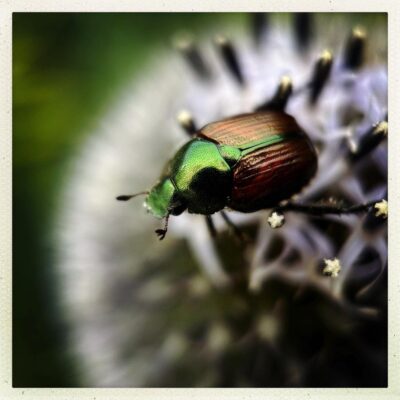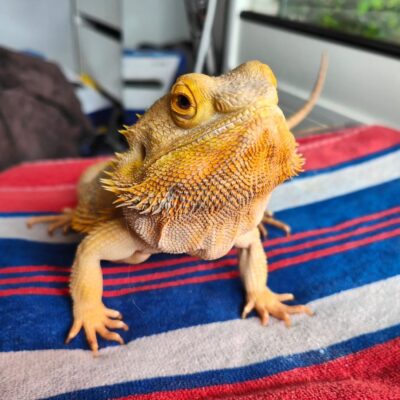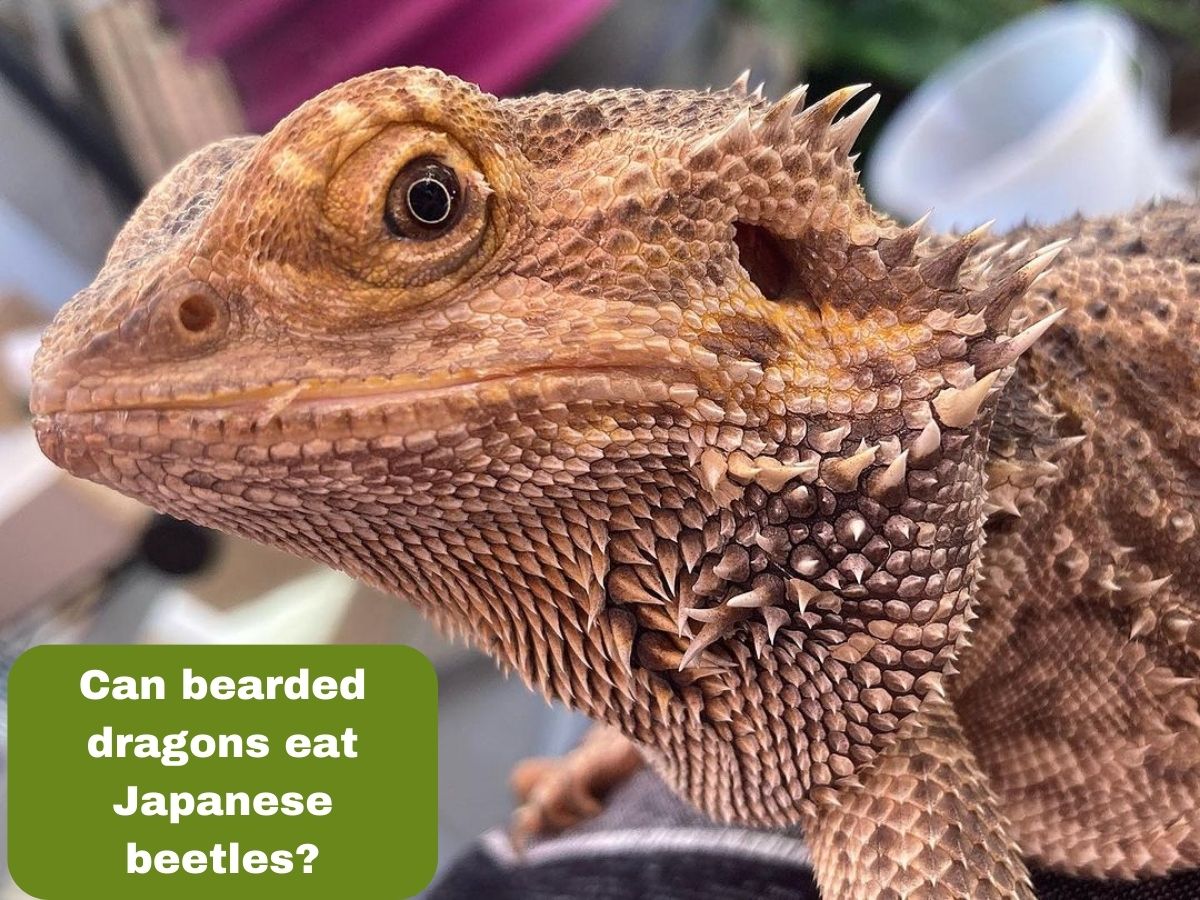Curious about the dining habits of your bearded dragon and whether they can indulge in some crunchy Japanese beetles? You’ve come to the right place; We’re here to explore the fascinating question: can bearded dragons eat Japanese beetles?
Bearded dragons are undoubtedly charming and unique pets, captivating us with their scaly charm and quirky personalities. As responsible owners, we always strive to provide them with a well-rounded diet that keeps them healthy and happy. But when it comes to offering insects, it’s crucial to be cautious and well-informed.
In this engaging article, we’ll delve into the world of bearded dragon nutrition and uncover the truth about Japanese beetles as a potential food choice. We’ll discover whether these striking insects pose any risks or if they can be a delightful treat for our scaly friends.
So, hold on to your hats (and your beetles), as we embark on this exciting journey to find out if bearded dragons can feast on Japanese beetles without any worries. Let’s feed our curiosity and ensure our pet’s well-being at the same time.
Understanding Bearded Dragon Diets
Bearded dragons, the enchanting reptilian companions, have fascinating dietary preferences in the wild that have shaped their nutritional needs as pets. In their natural habitat of arid regions in Australia, these omnivorous creatures have a diverse diet, which has a significant impact on their health and well-being.
In the wild, bearded dragons are opportunistic feeders, consuming a wide range of foods to meet their nutritional requirements. Their diet consists of insects, small vertebrates, leafy greens, flowers, and even fruits. This variety plays a crucial role in providing them with essential vitamins, minerals, and other nutrients they need to thrive.
As responsible keepers, we aim to mimic their wild diet by offering a balanced mix of insects and vegetables in captivity. Insects like crickets, roaches, and mealworms are excellent sources of protein, while leafy greens such as collard greens, kale, and mustard greens supply vital vitamins and minerals.

But that’s not all – we go the extra mile to ensure the insects we feed our bearded dragons are well-nourished themselves. This practice, known as gut-loading, involves feeding nutritious foods to the insects before serving them to our pets. Additionally, we dust these insects with a calcium and vitamin supplement, enhancing their nutritional value for our beardies.
By providing a diverse diet, gut-loading, and dusting insects, we can recreate the nutritional harmony bearded dragons enjoy in the wild. This not only supports their overall health but also brings out their vibrant colors and energetic personalities, making our reptilian companions a joy to behold.
Introduction to Japanese Beetles
Japanese beetles, those shimmering emerald-hued insects, may be mesmerizing to some, but they also raise important concerns, especially when it comes to the well-being of our beloved bearded dragons. As responsible pet owners, it’s essential to be informed about the potential risks that these beetles might pose to our scaly companions.
Japanese beetles are known to feed on various plants, and their diet might expose them to toxins or pathogens that can be harmful to bearded dragons if consumed. These potential hazards arise from the plants the beetles feed on, which could transfer toxins or carry pathogens that might affect our pets.
Given the delicate digestive systems of bearded dragons, it’s vital to be cautious about the insects we offer them as part of their diet. Understanding the risks associated with Japanese beetles can help us make informed decisions and ensure the safety and well-being of our scaly friends.
In the following sections, we’ll delve deeper into the question of whether bearded dragons can eat Japanese beetles and explore safer alternatives to provide them with a nourishing and enjoyable dining experience. Let’s equip ourselves with knowledge and make wise choices for our endearing reptilian companions.
Can Bearded Dragons Eat Japanese Beetles?
Based on expert research, it is generally recommended to avoid feeding Japanese beetles to bearded dragons. While bearded dragons are omnivorous and can consume a wide variety of insects, certain precautions should be taken when selecting their food.
Some owners might consider offering Japanese beetles to their bearded dragons due to their availability and convenience, especially if the beetles are present in the surrounding environment. Additionally, these beetles are visually striking and may be mistaken as a potential treat for our reptile companions.

However, caution is necessary when considering Japanese beetles as part of a bearded dragon’s diet. These insects have the potential to contain toxins or pathogens from the plants they feed on, which could be harmful to the delicate digestive system of our scaly friends.
Furthermore, even if the beetles themselves are not directly toxic, they might have been exposed to harmful pesticides or chemicals from the environment, posing additional risks to our pets if consumed.
As responsible pet owners, it is best to err on the side of caution and choose safer alternatives for our bearded dragons’ diets. Opt for well-researched and nutritionally balanced options such as gut-loaded and calcium-dusted insects, as well as a variety of safe vegetables, to provide the best possible care for our beloved reptilian companions. Prioritizing their health and well-being ensures a long and happy life for these endearing creatures.
Nutritional Value of Japanese Beetles
When it comes to considering Japanese beetles as a potential food source for bearded dragons, understanding their nutritional value is crucial. While these metallic-hued insects might be visually appealing, it’s essential to know what they bring to the table, or in this case, the terrarium.
Japanese beetles, like many other insects, are primarily composed of protein. Protein is an essential component of a bearded dragon’s diet, as it supports their growth, muscle development, and overall health. These beetles also contain some fat, which provides a concentrated source of energy for our scaly companions.
However, when we compare the nutritional value of Japanese beetles with other commonly fed insects like crickets and mealworms, there are some differences. Crickets, for example, have a higher protein content compared to Japanese beetles, making them an excellent choice for promoting muscle growth and maintaining a healthy weight in bearded dragons.
Mealworms, on the other hand, are higher in fat and also contain a decent amount of protein. While some fat is essential for bearded dragons, excessive fat intake can lead to obesity and other health issues.
Additionally, crickets and mealworms are more readily available as feeder insects for reptile owners. Japanese beetles, being pests in many regions, might not be as safe a choice due to the potential accumulation of harmful substances like pesticides

Potential Dangers of Feeding Japanese Beetles
Feeding Japanese beetles to our bearded dragons might seem like a novel idea, but we must be cautious about potential dangers lurking beneath their alluring appearance. These vibrant insects, with their metallic green and copper hues, could pose risks that might compromise the health of our scaly companions.
One significant concern with Japanese beetles is the possibility of toxic components or chemical residues present in their bodies. These beetles are notorious for feeding on a wide range of plants, including those treated with pesticides and other chemicals. As a result, they can accumulate harmful substances in their bodies, which could prove detrimental to our bearded dragons if consumed.
When considering feeding wild-caught insects like Japanese beetles, we must address the issue of exposure to pesticides. In residential areas or agricultural regions, Japanese beetles are often controlled using chemical pesticides. If these beetles are sourced from such areas, there is a higher likelihood of them carrying pesticide residues on their bodies, which can transfer to our pet reptiles during consumption.
Pesticide exposure can lead to various health issues in bearded dragons, ranging from mild symptoms like lethargy and loss of appetite to more severe consequences that may require immediate veterinary attention.
To ensure the safety of our bearded dragons, it’s essential to avoid feeding them wild-caught insects like Japanese beetles. Instead, we should opt for commercially bred and gut-loaded insects, such as crickets and mealworms, which are free from harmful chemicals and have been raised specifically for reptile consumption.
By being diligent in our insect selection and offering a varied and nutritionally balanced diet, we can protect the health and well-being of our beloved bearded dragons, providing them with a safe and enjoyable dining experience without compromising their safety.
Safe Alternatives to Japanese Beetles
When it comes to feeding our bearded dragons, safety and nutrition should be our top priorities. To replace the potentially risky choice of Japanese beetles, we have a variety of safe and nutritious alternatives that will keep our scaly companions satisfied and thriving.
- Crickets: Crickets are a staple insect for bearded dragons and an excellent source of protein. They are readily available, easy to find at pet stores, and come in various sizes to suit your dragon’s age and appetite.
- Dubia Roaches: These roaches are low in fat and high in protein, making them an ideal choice for bearded dragons. They are also relatively easy to breed, providing a sustainable food source.
- Black Soldier Fly Larvae (BSFL): BSFL are rich in calcium, making them an excellent choice for maintaining strong bones and preventing metabolic bone disease in bearded dragons.
- Mealworms (in moderation): While mealworms are higher in fat, they can be fed occasionally as a treat or to add variety to the diet.
- Silkworms: Silkworms are high in protein and low in fat, making them another nutritious option for your bearded dragon’s diet.
- Phoenix Worms: Also known as calciworms, these larvae are rich in calcium and phosphorus, promoting healthy bone growth.
Choosing commercially bred insects is essential for the well-being of our bearded dragons. Here’s why:
- Quality Control: Insects bred for reptile consumption undergo quality control measures, ensuring they are healthy, free from parasites, and safe for consumption.
- Nutritional Value: Commercially bred insects are often gut-loaded and dusted with calcium and vitamins, maximizing their nutritional value for your pet.
- Pesticide-Free: These insects are raised in controlled environments, free from exposure to harmful pesticides or other chemicals that wild-caught insects might carry.
- Consistency: Commercial insect breeders provide a reliable and consistent supply, making it easier for you to maintain a balanced diet for your bearded dragon.
By opting for safe alternatives and choosing commercially bred insects, we can ensure our bearded dragons enjoy a diverse and nutritious diet, supporting their growth, health, and happiness as our scaly companions.
Feeding Guidelines and Tips
Introducing insects into a bearded dragon’s diet is an exciting and crucial step in providing them with a balanced and healthy meal plan. Here are some guidelines and tips to ensure a smooth transition and maintain the best possible diet for your scaly friend:
- Gradual Introduction: If your bearded dragon is new to eating insects, start with smaller and softer insects like small crickets or phoenix worms. Introduce them one at a time and observe your pet’s response. Gradually increase the variety and size of insects as your dragon becomes more accustomed to them.
- Gut-Loading and Dusting: Before offering insects to your bearded dragon, ensure they are well-fed on nutritious greens and fruits (gut-loading). Also, dust the insects with a calcium and vitamin supplement to boost their nutritional value before serving.
- Portion Sizes: The size of insects you feed should be appropriate for your bearded dragon’s age and size. A general rule is to offer insects that are no longer than the space between your dragon’s eyes. Avoid feeding insects that are too large, as they may cause digestive issues.
- Frequency: Younger bearded dragons require more frequent feedings, typically two to three times a day, while adults can be fed once a day or every other day. Adjust the frequency based on your pet’s age, size, and activity level.
- Variety is Key: Aim to provide a diverse diet to prevent your bearded dragon from becoming picky and to ensure they receive a wide range of nutrients. Alternate between insects like crickets, dubia roaches, and black soldier fly larvae, and include various vegetables and leafy greens to create a well-rounded menu.
- Watch for Overfeeding: Bearded dragons have a natural tendency to eat, so it’s essential to avoid overfeeding. Observe their weight and body condition regularly and adjust portion sizes accordingly.
- Supervise Feedings: Always supervise your bearded dragon during feeding to prevent any potential issues, like choking or aggression between multiple dragons in the same enclosure.
- Hydration: Remember to provide fresh water daily to keep your bearded dragon well-hydrated, especially if its diet consists mainly of insects.
- Seek Professional Advice: If you’re unsure about your bearded dragon’s dietary needs or have any concerns, consult a reptile veterinarian or experienced reptile keeper for guidance.
By following these guidelines and tips, you can create a nutritious and enjoyable dining experience for your bearded dragon, promoting their health, longevity, and happiness as your cherished pet.

Common Signs of Dietary Issues
As attentive and caring pet owners, it’s essential to be vigilant about our bearded dragon’s health and well-being. Their diet plays a crucial role in their overall health, and certain signs can indicate improper nutrition or potential health issues. Here are some common signs to watch out for:
- Weight Loss or Gain: Significant weight loss or sudden weight gain can be indicative of an imbalanced diet. Obesity can result from overfeeding fatty insects or offering high-calorie treats too frequently, while weight loss may signify a lack of essential nutrients.
- Lethargy and Weakness: If your bearded dragon appears lethargic, lack energy, or is unusually weak, it could be a sign of malnutrition or underlying health problems.
- Loss of Appetite: A sudden loss of interest in food may indicate a health issue or discomfort. It’s essential to monitor your dragon’s eating habits, as a consistent loss of appetite can lead to serious health complications.
- Changes in Stool: Abnormalities in stool, such as diarrhea, constipation, or unusual colors, may be linked to dietary issues or potential illnesses.
- Metabolic Bone Disease (MBD) Symptoms: MBD results from a lack of calcium and other essential nutrients, leading to weak bones, deformities, and difficulty moving. Signs include tremors, twitching, and a “rubber jaw” appearance.
- Difficulty Shedding: Improper nutrition can affect your bearded dragon’s ability to shed their skin properly, leading to retained shed or incomplete sheds.
- Dull or Faded Colors: A healthy bearded dragon should display vibrant colors. Fading colors could indicate nutritional deficiencies or stress.
- Behavioral Changes: Unusual behaviors, such as aggression, excessive hiding, or restlessness, may be linked to discomfort caused by dietary issues or underlying health problems.
- Dehydration: A lack of access to fresh water or not consuming enough can lead to dehydration, which can be harmful to your bearded dragon’s health.
If you observe any of these signs in your bearded dragon, it’s crucial to seek advice from a reptile veterinarian. Regular health check-ups are essential to catch potential issues early and to ensure your dragon receives the proper care and nutrition they need to thrive.
Remember, a balanced and varied diet, combined with a clean and enriched environment, is the key to keeping your bearded dragon healthy and happy for years to come.
Conclusion
Providing a well-balanced and nutritious diet is of utmost importance when caring for our beloved bearded dragons. While the idea of feeding Japanese beetles might be enticing, the potential risks and uncertainties associated with these insects make them less than ideal for our scaly companions.
Instead, we can opt for a variety of safe and nutritious insects readily available in the market, such as crickets, dubia roaches, and black soldier fly larvae. These insects, when gut-loaded and dusted with essential supplements, offer a diverse and wholesome diet that supports the growth and overall health of our bearded dragons.
Remember to introduce new insects gradually, monitor portion sizes, and maintain a consistent feeding schedule based on your dragon’s age and size. Always prioritize commercially bred insects to ensure their safety and nutritional value.
Additionally, be vigilant in recognizing signs of dietary issues or potential health problems in your bearded dragon. Prompt action and regular check-ups with a reptile veterinarian can ensure that any concerns are addressed promptly, safeguarding your pet’s well-being and longevity.
As responsible keepers, we have the power to provide our bearded dragons with the best care possible, offering them a life filled with good health, happiness, and the joy of delightful meals that keep their scales shining brightly for years to come.
